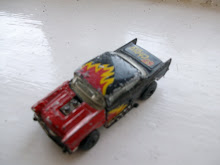For the last couple of years, for want of anything else to get me at Christmas, my mother has given me the most recent editions of Bygone Whitehaven, a series by a guy called Michael Moon (the first six alongside his then wife Sylvia). Since I was a young kid, I always had an interest in local history, inherited from my dad, so I find a lot of interest in these. Top bookshop he runs too, if you happen round that way.
Being up to double figures in this series, the author has begun using pictures of the town that are vaguely recognisible to me, born in 1981. My memories of my town in the 1980s seem, in the main, fairly grim. The main street was covered with these horrid brown brick things that would hold dying plantlife. The bricks were the same as those used to make the brutalism-inspired multi-storey car park that loomed over one end of the town. At the other end, in the harbour, were two huge silos used to store chemicals used for the detergent factory up on one side of the valley the town centre sat in. All of these are gone now, bar the car park.
As we were constantly told by teachers in our history lessons, Whitehaven used to be the third biggest port in the country, behind London and Bristol. We were also told that New York nicked their idea of having streets on a grid pattern from us as well, which strikes me as a bit implausible, but you take whatever you can when it comes to boasts when you were a kid in the 80s/90s where you were told at school that unless you had enough brains to get out of town, your options were either the army or the dole.
Coal was a major reason of why the town was such a player on the national stage, once upon a time. When you read about the 1980s in England, and of all the defining moments of that time, the Miners’ Strike would be a big one. I was too young to remember the events, but what I do recall is both my mother refusing to say the name Thatcher (it was always “that woman”) due to her staunch support of an industry that was a huge part of her family – two of her brothers were working in Whitehaven's last pit during the strike and would end up laid off when the axe fell in 1986. I can also remember the times I visited one of those uncles, whose house overlooked the pit - handy for the commute. Looking from the living room window down to the site, even then I could feel some sadness of its slow descent into dereliction. Years later, it was saved from demolition and began a worthwhile new use as a museum of the town’s mining history.
I get a similar kind of sadness whenever I take the train between Whitehaven and Carlisle and pass through where Workington's old steel works stood. The story I was always told was that railway lines made from Workington steel were the best in the world, exported as far as India. Naturally, some genius had the idea to shut the whole site down.
My town has changed almost beyond recognition in my lifetime. A lot of it is for the better: the harbour especially was a complete dump back then and it looks modern and relatively looked after these days. But when I do think back to the limited amount of past that I can, there’s sorrow and anger of a world that was allowed to pass by successive governments: West Cumbria used to have a sense of purpose and even if the work was dirty, hard and very dangerous, it created a sense of pride. Which leads to the central problem: it wasn't the removal of the industry itself (arguments about coal mining being uneconomical and creating an un-environmentally friendly fuel are valid) but the lack of anything to replace it that may leave places like Whitehaven and Workington as ghost towns in the decades to come.
Rant over, but Don Draper was right, as he so often is (the handsome swine), when he used a definition of nostalgia as ‘pain from an old wound’.
Wednesday, 4 April 2012
Subscribe to:
Post Comments (Atom)

No comments:
Post a Comment